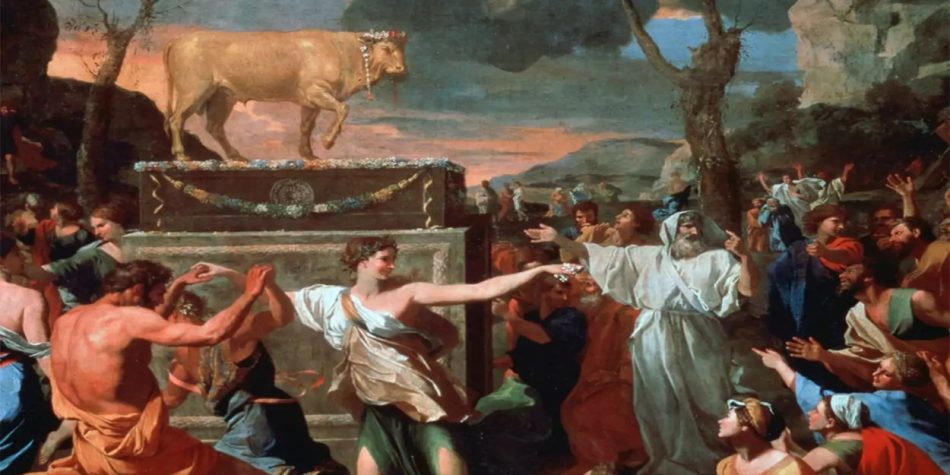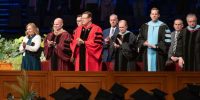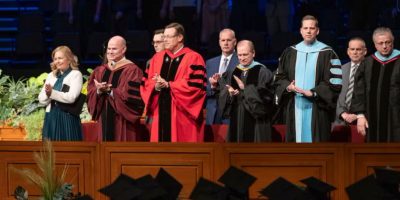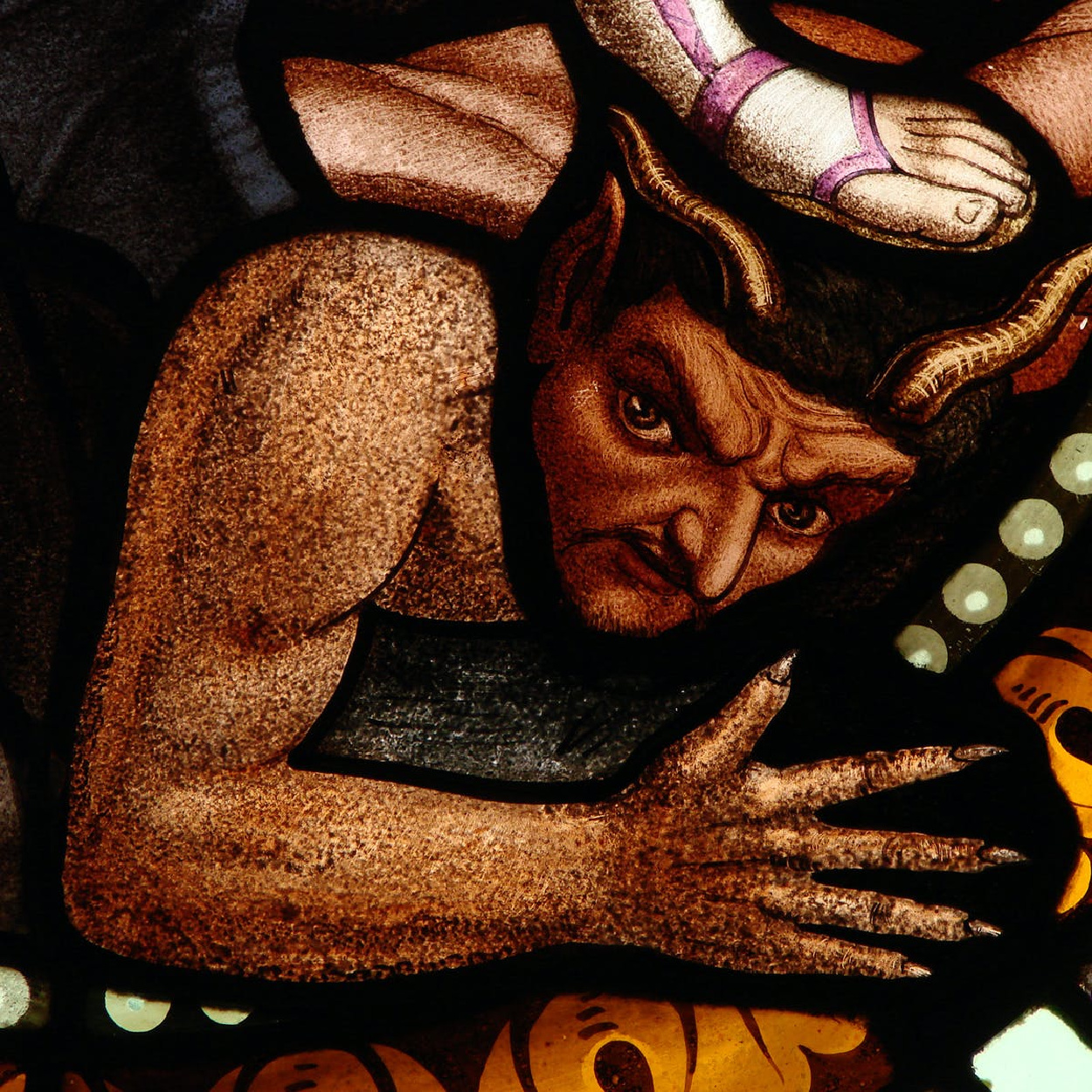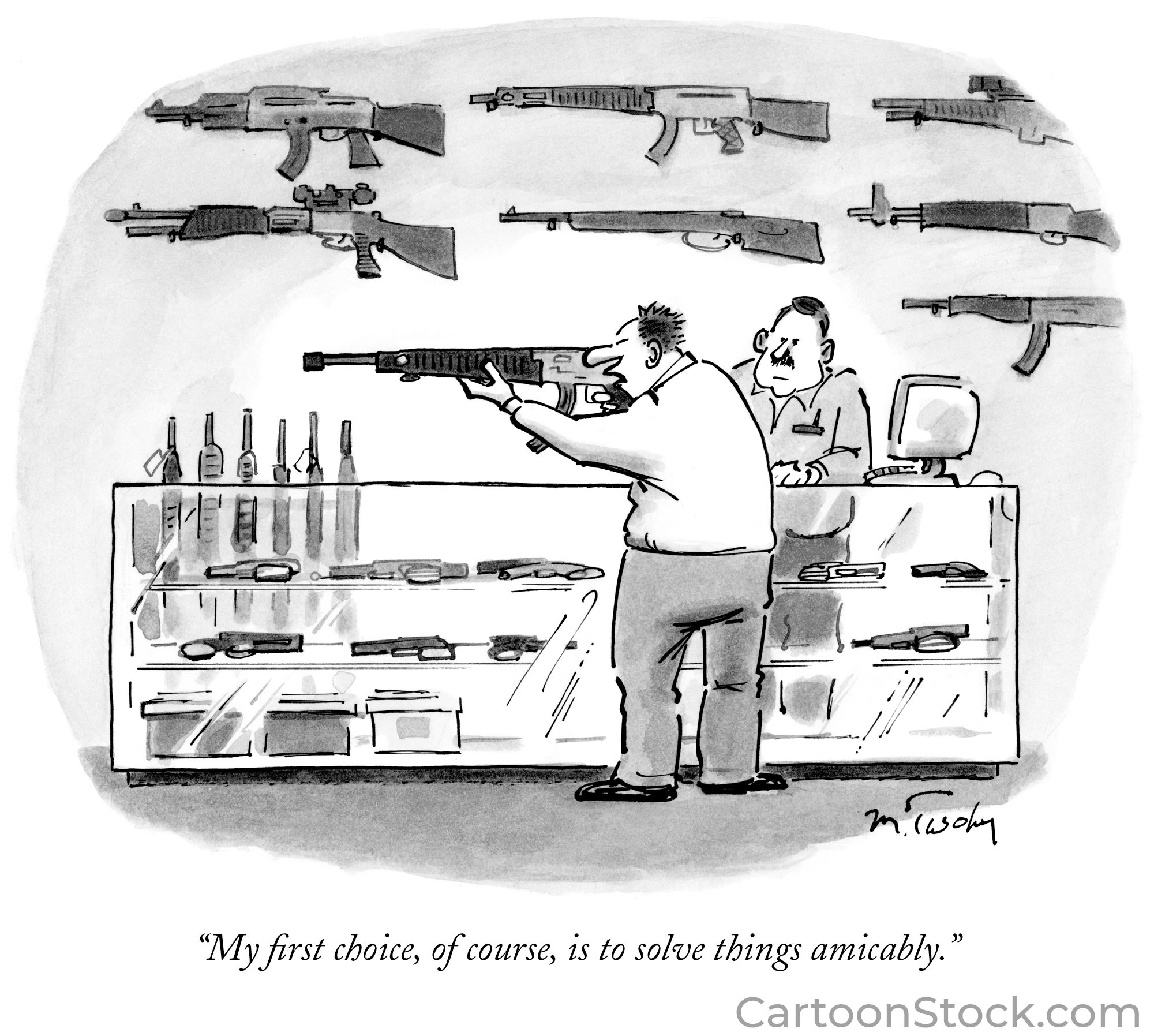“To be in the world but not of it” is a familiar characterization of the challenge of the Christian life. Though not exactly scriptural, the formula captures something of the spirit of John 17:15-18:
I pray not that thou shouldest take them out of the world, but that thou shouldest keep them from evil.
They are not of the world, even as I am not of the world.
Sanctify them through thy truth: thy word is truth.
As thou hast sent me into the world, even so have I also sent them into the world.
John teaches that we are sent into the world, just as Christ was sent. But we are not of the world.
Holy writ teaches: “God loved the world and sent His Son to redeem it” (John 3:16), but “His kingdom is not of this world” (John 18:36). “The friendship of the world is enmity with God” (James 4:4), and the world’s “wisdom is foolishness to God” (1 Cor 3:19).
To be sure, Restoration Christians (i.e., members of The Church of Jesus Christ of Latter-day Saints) have always been under command to embrace good wherever and however it is found, whether from directly and authoritatively “otherworldly” sources (scripture and prophets) or from sources more tied to this world. We have a vivid sense of being agents unto ourselves, engaging in good causes of our own free will (D&C 58:27-28), endowed with a capacity to understand and produce goodness, a capacity not eradicated by any “original sin.”
But what is this good? And how does it stand in relation to the idols of “this world”? How are we to be agents for good in this world without becoming of this world?
Daniel Mahoney’s Critique of the Idol of Our Age
This risk of importing the world unknowingly into our moral vision is apparent all around us as we see Christian love interpreted to serve the purposes of moral relativism and boundless self-expression. The world now increasingly identifies “love” with non-judgmentalism; that is, the complete denial of enduring moral standards. At the same time, this modulation of morality somehow claims the authority of reason, dismissing all objections to it as “irrational” or based on mere “prejudice” or “bigotry.”
Reason and religion are thus corrupted together in the world’s perversion of Christian love.
In an important book, The Idol of Our Age: How the Religion of Humanity Subverts Christianity, Daniel Mahoney, the Augustine Chair at Assumption College in Massachusetts, has well articulated the subversive power of an increasingly prevalent religion of humanity that claims to be the true heir and fulfillment of the Christian ethic of love:
Woefully ignorant of sin and of the tragic dimensions of the human condition, [the religion of humanity] reduces religion to a project of this-worldly amelioration. Free-floating compassion substitutes for charity, and a humanity conscious of its unity (and utter self-sufficiency) puts itself in the place of the visible and invisible Church.… Christianity is shorn of any recognizable transcendental dimension and becomes an instrument for promoting egalitarian social justice, usually in the name of an ideological conception of the poor (Pope Francis increasingly clearly fits into this category). One cannot help but ask if Christianity is inherently vulnerable to humanitarian appropriation, as Nietzsche suggested with hostile intent. [French political philosopher] Pierre Manent, with no hostile intent, has argued that the religion of humanity would never ‘have attained its empire over our souls if it did not appear as the extension and the consequence, perhaps the effectual truth, of Christianity, of the religion of the neighbor.’ Manent suggests that ‘the feeling of the same,’ the vague but powerful sentiment of a common humanity on the way to full realization in a unified human race, appears to many in the modern democratic world as “the truly human form, the final form of Christian charity.”
Restoration Christians may imagine that they are invulnerable to this humanitarian subversion of Christianity. Indeed, our firm foundation is in a clear and robust plan of salvation, a plan strongly linked to moral teaching by no means reducible to soft humanitarian compassion too often void of theological substance. Our sustaining of modern prophets, who regularly reaffirm this plan and its complement in moral doctrine, ought to fortify us against the allure of the more vacuous forms of secular humanism.
But the prestige of the “great and spacious building” and the “praise of the world” remains powerful among those who wish to appear “right-thinking” and desire to walk within circles where paeans to secular progress now replace personal moral rectitude as the highest good.
This is why the subtle, but growing progressive push to transform religion into a kind of theologically vacuous humanitarianism worries me—it’s fundamentally unchristian.
This illusion is all the more seductive because a kind of halfway house seems to be available to those who feel loyalty to true religion but who do not want to be excluded from a wider and more prestigious intellectual sphere; one religious leader referred to these cases as those who seek a residence in Zion with a summer cottage in Babylon.
Now, to be sure, I’m not against humanitarianism, and you shouldn’t be either. After all, humanitarian efforts aimed at the relief of suffering and the distribution of material goods are one authentic expression of Christian charity. The Church of Jesus Christ of Latter-day Saints gladly and effectively participates in the work of humanitarian relief, often side by side with other faith groups as well as with non-religious organizations. Such work for the relief of human suffering is unquestionably an essential part of the Christian life.
The expression of Christian charity in the work of material relief only becomes problematic when solicitude for physical needs and personal self-expression begin to eclipse, if not entirely exclude, a higher moral and spiritual perspective. For the true Christian, the Savior’s admonition to sell all one has and give to the poor must live alongside His later rebuke to those who said, “Why this waste? This perfume could have been sold for a high price and the money given to the poor.”
The true Christian must understand that Christ didn’t simply dedicate His ministry exclusively to healing the sick or providing food to the masses—He did much of that, of course—but He also taught, wept, traveled, suffered, parried with Pharisees, cleansed the temple, participated in religious ordinances and rituals, and founded a faith that would continue to proliferate to the present day.
This is why the subtle, but growing progressive push to transform religion into a kind of theologically vacuous humanitarianism worries me—it’s fundamentally unchristian. More and more, however, I see rhetorical shifts within the intellectual class of my own faith tradition—and those of other traditions—that suggest a kind of reimagining of religion as merely a vehicle or means to carrying out a political social justice end. An effective tool for delivering humanitarian work sans any genuine connection to rigorous religiosity. Without questioning the faith of undoubtedly well-meaning church members and thinkers, it’s nonetheless important to identify these rhetorical shifts and consider their impact on any faith’s core aims to remain focused on lived faith and the essential teachings of the gospel of Jesus Christ.
Modernizing of the Restoration?
An instructive discussion of the place of humanitarian causes, and, more generally, of distinctively modern ethical concerns within Restoration Christianity is a recent interview at the “Faith Matters” website with Patrick Mason, Leonard Arrington Chair of Mormon Studies at Utah State University and author of Planted: Belief and Belonging in an Age of Doubt.
Mason is a believer. And, in some ways, he presents himself as a simple, ordinary believer in the sense that he was raised in the Church of Jesus Christ, and never had a “faith crisis” such as professed by many today who hold themselves out as “thoughtful,” “nuanced,” or “enlightened” believers. Rather, he presents his conversion as supported by revelatory moments and overall, as he says, “organic,” not agonized.
And so it is from the standpoint of a securely “planted” and believing Latter-day Saint that Mason considers the question of the Church in the 21st Century.
Mason’s central premise in considering the Church’s future is that the institution was born “modern,” and so came without all the premodern baggage that burdened many older religions. Mason enthusiastically embraces a modern framing of the Church’s teaching and in fact goes a step further by distancing himself at the outset somewhat from many of the Church’s founding teachings and characterizing himself as open to the new possibilities arising for young members maturing in the Church of the 21st century.
Rather than “grasp for the respectability of pre-modern religion,” Mason invites us to look at the Restoration as a 19th-century phenomenon, as grounded, not in fixed ideas or ideals but in “the century of progress,” and to see its teachings as resonant with a modern openness to “science,” “democracy,” and especially the open possibilities of “progress” itself. Certainly, on the surface, this is an admirable sentiment. A kind of openness to the unfolding of revelation and progress can be positive.
But Mason also seeks to include in this modern openness to progress “the Restoration’s notion of the human person.” Now, the notion of personalism, the idea of personal dignity as fundamental to an adequate ethical and spiritual worldview, is a venerable theme with roots both in Immanuel Kant’s modern ethical theory of moral autonomy and in 20th-century appropriations of the legacy of Roman Catholic moral philosophy and theology.
Rich and instructive debates have sprung up within schools of personalist philosophy from its beginnings, in particular debates on the status of the individual human being in relation to the common good of collective bodies such as family, political community, and church, and these debates are far from exhausted today.
But Patrick Mason identifies personalism with modernity and modernity with individualism: for him, it seems, the dignity of the person means “moving away from society as the basic unit, and the idea that the individual exists to serve something greater than that, whether it be the family, or the community, or the church, or something like that.” Thus, one can’t help but read Patrick Mason’s key for interpreting the Restoration as modernity’s fundamental commitment to “the individual” as defined by, well, the individual.
Considering distinctive Restoration teaching on divinity and humanity in the light of this modern principle of the human person as “individual,” Mason arrives at the insight that we are “not just creations of God created in His image, but we are actually gods.” (He also uses the more familiar phrase, “Gods in embryo.”) “[T]his is the core of our theology.” He proposes that we “spin it out” in its implications “for every aspect of our life, for our politics, our economics, our gender relations,” etc. Mormonism’s “third century” will be constructed by taking this central modern and Restoration insight and running with it: “God’s given us this gift, and now He’s saying, ‘All right, y’all, figure it out, and go do something with it.'”
By pursuing the implications of this modern, individualistic reframing of the human person, of the divinity of the individual, “the new generation is going to rediscover the Restoration for themselves,” Mason predicts.
But Mason does appear able to in fact predict, at least a little, what must be the direction of this new modern and progressive gospel. Mason clearly is not just waiting to find out; in some way he is helping to preach the emerging new gospel already.
What, then, shall we do, according to this vision of 3rd-century Mormonism? Well, to have a real impact in the 21st century, Mason proposes that we overcome the old language of “saints and gentiles,” the old division between the Church and the world. To define a community in the old-fashioned way risks being “exclusive and destructive to some group.” We must avoid any “oppositional identity”—apparently including not being “of the world.”
Later, Mason’s interviewers seem ready to dispense with old-fashioned, baptism-centered missionary work in favor of inclusive humanitarianism. Mason pushes back, coming down in favor of the Church continuing its missionary efforts. But he meets them halfway (at least) by proposing that we go ahead and continue what we have “traditionally done” and then “layer on top of that a new kind of mission, a mission to the world that isn’t just focused on getting them baptized.”
We are right to tell students that the Lord “is fitting you for a world that needs you.” But is the world the best judge of just how it needs the Lord’s disciple-scholars?
“Just being baptized” sounds pretty unexciting in this context, to be sure, and so Mason proposes to “flip that script, and actually figure out what other people’s questions are”—questions like ecological justice, refugees, multicultural communities, social and political issues, and mental illness. By accepting a kind of social justice, progressive humanitarianism script, we are of course accepting many of the world’s definitions and framings—some of them explicitly political—of the problems and challenges of the human condition.
Rather than teaching or preaching faith and repentance, we need to listen to how others connect to God, Aubrey Chaves suggests, and Patrick Mason agrees. This apparently is what it means to put “the individual,” or the god (in embryo) at the center of our theology: we should accept how the gods around us understand their own divinity (and identity), and not impose our own understanding (or perhaps God’s understanding). As Mason puts it, with his gift for articulating a faith with a progressive accent that is still recognizably a faith tradition, “hearing God’s voice by blending those things [the Church and the world] together rather than putting them at odds with one another.”
Let me say that Professor Mason and his interviewers are quite right that the gospel is expansive and open-ended, that we should stand ready to be surprised by developments in the Church’s mission in the 21st century, and that we can learn much by listening to people who do not share our basic beliefs and by exploring ideas that seem to stand outside the gospel. But clearly this is something different from subtly interpreting the Restoration in the light of modern individualism and thus appearing ready to relegate fundamental beliefs—such as Christ’s teachings and admonishments regarding the preeminence of ordinances —to the status of increasingly outdated notions from another century or wholesome residues of a tradition that we are ready to move beyond.
Again, to his credit, Mason recognizes the difficulty of sorting out what belongs to our culture from what comes from God – “the billion-dollar question,” as he says. But clearly he is pretty confident concerning what is merely “cultural”—what counts as the “baggage of patriarchy” for example—and what is essential—what is modern and progressive—in the faith tradition. It is quite interesting then, to hear Mason’s reflections on the problem of cultural influence—the problem, we might say, of this world’s tendency to invade and colonize our understanding of what it means to follow Christ: “We can’t even see it, because we’re swimming in it.” Remarkably, and perhaps ironically, he seems unconcerned about the possibility that modern progressive individualism may in fact be that ocean.
Humanism and the Academy
BYU professor J. Spencer Fluhman, in a recent devotional address, “The University of Kingdom of God,” notes that universities have drawn back from the promotion of “moral, ethical, or spiritual development,” from “fostering public morality or human flourishing in a broad sense”; instead, “academic disciplines … have drawn narrow lines around intellectual inquiry . . . ”
He holds that Brigham Young University “will not and cannot divorce itself from the big questions of human experience . . . questions of human flourishing or morality or even holiness.” Quoting Elder Neal A. Maxwell, he observes that the prioritizing of the “big questions” involves recognizing “the supernal truth [of the redeeming presence of our loving Father-God] which, along with His plan of happiness, reigns preeminent and imperial over all other realities.”
Fluhman also affirms, this time quoting Elder Jeffrey R. Holland of the Quorum of the Twelve Apostles of The Church of Jesus Christ of Latter-day Saints, that this broader inquiry is inseparable from the cultivation of virtues of the soul: “Your soul must be one—integrated, intact, and whole.”
All this is quite well said and in fact profoundly important in understanding BYU’s proper role in higher education. But, disappointingly, when venturing some examples of such an educational ideal, Fluhman seems rather noncommittal concerning any moral vision that might inform higher education and adopts a more humanitarian perspective that would be perfectly at home in the more narrowly secular educational institutions he at first critiques.
In inviting students to join in the work of building God’s kingdom, or to “change the world,” he states:
God . . . is fitting you for a world that needs you. There are always problems afoot that will demand our very best and then some. From poverty to racism to ecological collapse to rampant inequality to sexual violence to poor healthcare to religious freedom to deficient education—this world groans under the weight of our collective failures.
There is nothing, or little, to object to in Fluhman’s list of concerns. In fact, his vision of a holistic education at BYU, which takes the form mainly of the relief of material suffering and the advancement of other recognizable humanitarian and political causes, might well be considered the official position of the university.
The grounding work of personal moral reform—so essential to the gospel of Jesus Christ—is often what’s absent from the humanist aspirations of other institutions of higher education.
Speeches by university leaders in recent years sometimes tend to translate BYU’s uniquely religious educational mission into humanitarian outreach, moving seamlessly from praise of our soulful view of the life of the mind to a commitment to good works, especially good works that mobilize technological advances in order to make people’s lives better materially. Of course good works of practical utility are a vital expression of a Christian education, but increasingly we at BYU seem simply to identify the educating of the whole soul with a commitment to and technological capacity for sharing material improvements.
It is notable that in the repeated translation of holistic education into humanitarianism, the questions of the mind’s elevation and the soul’s redemption are sometimes set aside; in Fluhman’s speech, for instance, such concerns might be discerned only obliquely in what some might see as an anodyne reference to “religious freedom.” To be sure, those who see education from Elder Maxwell’s and Elder Holland’s perspective have every reason to embrace worthy efforts to relieve others, often working alongside secular humanitarian partners. But what then of the distinctive contribution of disciple-scholars?
As Elder Maxwell notes, in one of the sermons cited by Fluhman, “[E]ver acknowledging God’s redeeming hand is very important, but, alas, so doing is diminished by the unwise mortal reliance on ‘the arm of flesh’ (2 Ne. 4:34; D&C 1:19).” We are right to tell students that the Lord “is fitting you for a world that needs you.” But is the world the best judge of just how it needs the Lord’s disciple-scholars? Does it need something more than, something beyond the ever-present and legitimate concern for material suffering—does it need disciple-scholars who can first and foremost deliver salvation to the soul?
In the Maxwell Institute address that Fluhman quotes, Elder Holland warns against “bracketing one’s personal faith, its truth claims, and moral judgments” in such a way that “no one knows exactly where authors are coming from ideologically.”
Elder Maxwell again:
If one chooses to live out his life without God, however, it will be as if he had been sentenced to remain a permanent resident in an airport transit lounge—consigned there, briefly and expectantly, to mingle with the ever-changing, lonely crowds. Somehow, in that forlorn situation, even being granted a cot and a hotplate in the corner of the transit lounge would not ease either the sense of anomie or futility.
Someday, in the search for wholeness in thought and behavior, we shall see much more clearly how orthodoxy “is our reward, not solely our goal” (Paul L. Holmer, C. S. Lewis, The Shape of His Faith and Thought, p. 115).
In our enthusiasm for progressive and humanitarian causes, are we preparing our students, our neighbors, and ourselves to “change the world” in a spiritual sense; that is, by offering it the reward of right belief, and right action, as an alternative to the spiritual suffering of a “life without God”?
To venture beyond the narrowness of conventional, secular education, to love God with all our minds in a way that opens us to the “big questions and to “supernal truths,” it seems we will also have to see beyond the unmoored humanitarian vision that we share with the secular world and understand from whence that humanitarian vision must spring.
Safe Places
Another recent BYU devotional address, Eric Huntsman’s “Hard Sayings and Safe Spaces: Making Room for Struggle as Well as Faith” also raises timely and important questions concerning the Restoration Christian’s engagement with the contemporary world, its ideologies and sensibilities.
Professor Huntsman is certainly right that we must “make room for struggle”; that is, open our hearts in order to provide loving encouragement to those who struggle to accept the doctrines and the moral demands of the gospel. Certainly, as he says, we should never abandon anyone within our circle of influence to face such struggles alone. But much depends on the shape of the “space” in which we come together, or the moral and spiritual atmosphere of this room into which we welcome those who struggle spiritually and morally (as we all do, in some way).
But in a world where Christian love itself is increasingly interpreted as in the service of a secular and relativistic individualism, it is important to emphasize truth at least as much as tolerance, virtue at least as much as equality.
What makes a space “safe”? The term “safe space” is hardly a neutral or unburdened one in today’s culture. As Huntsman notes, this term is used in “broader society” in connection with “trigger warnings, . . . microaggressions, . . . or the need to shield ourselves from difficult language and ideas.” “Safe spaces” in this current acceptation means a space free from all political arguments that contradict my feelings and from any potentially inconvenient moral judgment, a place where I can assert my identity and cling to my own mode of self-expression without fear of being contradicted. In this sense, the language of “safe space” presupposes a morality of extreme individualism: I am what I am and I must not be exposed to any suggestion that I ought to be other than what I am.
To be sure, Huntsman seems to distance himself from the currently accepted meaning of the term. “I do not necessarily use it in the same sense as some in our broader society use it,” he states (emphasis added). Most importantly, he delimits his definition of safe spaces by the proviso: “Without diluting the doctrine or compromising our standards . . .”
Although he stipulates this wise qualification twice, using exactly the same language, he never really discusses how a “safe space” structured in terms of or informed by authoritative doctrine and moral judgment would be different from the secular-individualist and morally nonjudgmental spaces defined by the contemporary ideology of identity politics. And, in fact, it is all too easy for the language of Christian love to be put in the service of more secular ideologies of extreme individualism or identity politics.
The difficulty in pursuing a Christian ethic of love as distinct from the contemporary ethic of extreme individualism lies precisely in our conception of the human person. “Jesus’ interactions were always tailored to the understanding and needs of the individual,” Huntsman says. This is true. The challenge of Christlike love is to open ourselves fully to the reality of individual human persons different from ourselves, but without for a moment losing sight of the eternal truths that ground and guide our love, our care, and our service. In other words, we first must love God, who tells us that if we really love Him we will keep His commandments. Our “tailoring” will be very different according to whether our “safe space” is built within a framework of genuine Christian doctrine and morality or whether it obeys the extreme individualist logic of secular “safe spaces.”
A space that is maximally “safe” for—that is, conducive to—genuine growth towards real sainthood, Christian discipleships, and abundance of life, will be quite different from one that is designed to flatter and not to correct every demand expressed by “the natural man”—especially in a political and ideological environment that sometimes puts a premium on certain claims of victimhood or entitlements and social prestige associated with those claims. Of course, there are true victims who deserve attention—but, sadly, there are some who leverage the market of attention for their own ends.
Professor Huntsman’s use of the term “safe space” does not necessarily imply acceptance of the secular understanding of that space. Still, the choice of terms is consequential and reinforces a certain emphasis—a rhetorical shift.
Church leaders have warned against severing tolerance from truth. Of course Professor Huntsman gives excellent counsel when he reminds us that we indeed need to overcome prejudices, to listen open-heartedly to those who struggle, and to recognize our equality as sons and daughters of God. But, while he grants that “accepting does not mean that we condone, agree with, or conform to [others’] beliefs or choices,” it does mean that “we allow the realities of their lives to be different from our own.”
But just what does it mean to “allow” for the “reality” of such differences? Is there no common moral and spiritual reality that stands above our own individual conceptions of our own lives? To be sure, we must tolerate differences that we do not fully understand and may in any case be powerless to change, but do we really want to grant that those who are struggling with “hard sayings” inhabit a different moral and spiritual reality than the one defined by the truths that we believe in and stand for?
Christian Love and Worldly Progress
To separate tolerance from truth, to emphasize the immediate emotional “safety” of a space over its orientation towards truth, though minor rhetorical pivots, still tend to move the frameworks of faith toward a humanitarian subversion of Christian love against which Daniel Mahoney is warning us. The challenge of maintaining the integrity of the Christian ethic is a permanent one, because there is no simple and general solution to the problem of holding truth and tolerance together, knowing when to speak and when to listen, how to affirm and share truth while being on guard against one’s own prejudices. I appreciate that thinkers like Mason, Fluhman, and Huntsman are working out these questions in real time. It’s not easy to get it all perfect.
After all, there is no simple or general answer to the question of the proper balance or integration between our humanitarian efforts in providing material relief and opportunity and our educational, moral, ecclesiastical, and missionary efforts that look to the proper goods of the soul. But in a world where Christian love itself is increasingly interpreted as in the service of a secular and relativistic individualism, it is important to emphasize truth at least as much as tolerance, virtue at least as much as equality. We should not imagine that we can avoid being “of the world” simply by serving the world just as it wants to be served, or by reinforcing the world’s own conceptions of the “equal dignity” of the individual or the path to human progress.
Elder Neal A. Maxwell, again (“From Whom All Blessings Flow”):
The redeeming presence of our loving Father-God in the universe is the grand fact pertaining to the human condition. Other truths, by comparison, are merely fleeting factoids about which we may be “ever learning” without coming to a knowledge of the grand truths (2 Tim. 3:7). . . .
Thus, ever acknowledging God’s redeeming hand is very important, but, alas, so doing is diminished by the unwise mortal reliance on “the arm of flesh” (2 Ne. 4:34; D&C 1:19). Ah, the arrogant arm of flesh, … Such naïveté, such triviality symbolize not only the arm, but also the mind of flesh, which misses “things as they really are, and … things as they really will be” (Jacob 4:13).
The ideology of secular humanitarianism offers what appears to be an attractive merging of edifying spirituality and worldly ambition, divine aims pursued by the arm of flesh. How conveniently inspiring to learn that our distinctive holistic education puts us on the broad path toward the Great and Spacious building of the world’s “Progress”! But the fact that many progressive and humanitarian causes overlap superficially with aims and expressions of Christian love must not obscure the fact that these two conceptions of human purposes, these two spaces of human meaning, are fundamentally different in their orientations.
All proclaim “peace,” but the question is whether peace begins in a well-ordered soul under God, or in progressive ideologies that promise to combine liberation from moral limits on the individual self and its identity with global prosperity and concord. President Dallin H. Oaks, paraphrasing Christ and quoting Elder John A. Widtsoe, in his 2019 Christmas devotional remarks, teaches that moral and spiritual peace is the only foundation of peace in this world: “The only way to build a peaceful community is to build men and women who are lovers and makers of peace. Each individual, by that doctrine of Christ and His Church, holds in his own hands the peace of the world.”
Similarly, Elder Holland (again in his Maxwell Institute speech), quoting J. R. R. Tolkien’s Gandalf, provides excellent counsel for living in and improving the world without becoming part of it, without joining its forces: “It is not our part to master all the tides of the world, but to do what is in us for the succour of those years wherein we are set, uprooting the evil in the fields that we know, so that those who live after may have clean earth to till. What weather they shall have is not ours to rule.”

